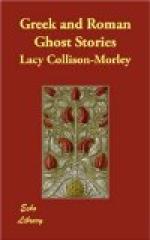In addition to these there were numerous special temples or places where the souls of the dead, which were universally thought to possess a knowledge of the future, could be called up and consulted—e.g., the temple at Phigalia, in Arcadia, used by Pausanias, the Spartan commander;[53] or the [Greek: nekyomanteion], the oracle of the dead, by the River Acheron, in Threspotia, to which Periander, the famous tyrant of Corinth, had recourse;[54] and it was here, according to Pausanias, that Orpheus went down to the lower world in search of Eurydice.
Lucian[55] tells us that it was only with Pluto’s permission that the dead could return to life, and they were invariably accompanied by Mercury. Consequently, both these gods were regularly invoked in the prayers and spells used on such occasions. Only the souls of those recently dead were, as a rule, called up, for it was naturally held that they would feel greater interest in the world they had just left, and in the friends and relations still alive, to whom they were really attached. Not that it was impossible to evoke the ghosts of those long dead, if it was desired. Even Orpheus and Cecrops were not beyond reach of call, and Apollonius of Tyana claimed to have raised the shade of Achilles.[56]
All oracles were originally sacred to Persephone and Pluto, and relied largely on necromancy, a snake being the emblem of prophetic power. Hence, when Apollo, the god of light, claimed possession of the oracles as the conqueror of darkness, the snake was twined round his tripod as an emblem, and his priestess was called Pythia. When Alexander set up his famous oracle, as described by Lucian, the first step taken in establishing its reputation was the finding of a live snake in an egg in a lake. The find had, of course, been previously arranged by Alexander and his confederates.
We still possess accounts of the working of these oracles of the dead, especially of the one connected with the Lake of Avernus, near Naples. Cicero[57] describes how, from this lake, “shades, the spirits of the dead, are summoned in the dense gloom of the mouth of Acheron with salt blood”; and Strabo quotes the early Greek historian Ephorus as relating how, even in his day, “the priests that raise the dead from Avernus live in underground dwellings, communicating with each other by subterranean passages, through which they led those who wished to consult the oracle hidden in the bowels of the earth.” “Not far from the lake of Avernus,” says Maximus of Tyre, “was an oracular cave, which took its name from the calling up of the dead. Those who came to consult the oracle, after repeating the sacred formula and offering libations and slaying victims, called upon the spirit of the friend or relation they wished to consult. Then it appeared, an unsubstantial shade, difficult both to see and to recognize, yet endowed with a human voice and skilled in prophecy. When it had answered the questions




